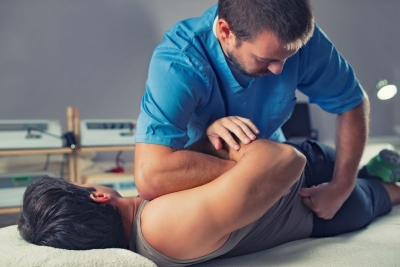
What is Chiropractic?
At its most basic, chiropractic is the belief that manipulating the joints and soft tissues of the body can assist with medical conditions. The spine, in particular, has been an increasing focus of chiropractic care as the discipline has evolved. Unfortunately, practitioners have had a difficult time proving themselves historically.
A Challenging Road to Accepted Medical Practice
The origins of chiropractic lie with Daniel David Palmer, who believed a doctor who’d been dead for 50 years gave him the secret to a long healthy life: careful spinal alignment. At the time, Palmer claimed that this would cure all ailments and that drugs and surgery were unnecessary. This philosophy shared some similarities with folk remedies of the past, such as bone-setting.
Over the next eighty years, doctors and chiropractors would be at odds, to the point where in 1966, the American Medical Association denounced chiropractors as members of a cult and boycotted the practice until 1987. The boycott ended not due to any sort of scientific revelation but because the AMA lost an anti-trust case.
That said, while many of Palmer’s original claims have been debunked, evidence has emerged that chiropractors can, in fact, help with certain conditions, particularly spinal pain. And, over time, as chiropractors have largely stepped away from Palmer’s claims and worked with scientists and doctors to understand their discipline, many doctors have warmed to chiropractic.
 Is Chiropractic Care Better Than Opioids?
Is Chiropractic Care Better Than Opioids?
Evidence is increasingly emerging that chiropractic treatment can assist with lower back pain and help patients stay away from opioids. A recent study of over 100,000 people with spinal concerns found that if they visited a chiropractor, their odds of filling a prescription for opioids were halved.
Another report, a meta analysis of six studies, found a higher drop of 64% (although these studies used smaller samples).
Unfortunately, the negative attitudes of the past linger. Even amidst the current opioid epidemic, some insurers still don’t cover chiropractic. Others, pointing to a lack of conclusive research, will only cover so many visits a year, with any others having to come from patients’ pockets.
In fairness, both doctors and chiropractors agree that the exact treatment mechanism remains unclear, but many patients self-report less pain following chiropractic treatment. Still, insurers can be skeptical when faced with something that has yet to be fully explained by the science.
That said, doctors are more likely to recommend conservative care such as chiropractic be tried first, with surgery and opioids increasingly seen as last resorts. Spinal pain patients in recovery should talk with their doctors and ask if chiropractic treatment may be a good choice for them.
How Harris House Can Help
A supportive environment can help chronic pain patients who are dependent on prescription opioids and can offer the emotional tools needed to stay on the journey to recovery. Contact us to learn more about the treatment programs we offer.


 Is Chiropractic Care Better Than Opioids?
Is Chiropractic Care Better Than Opioids?





